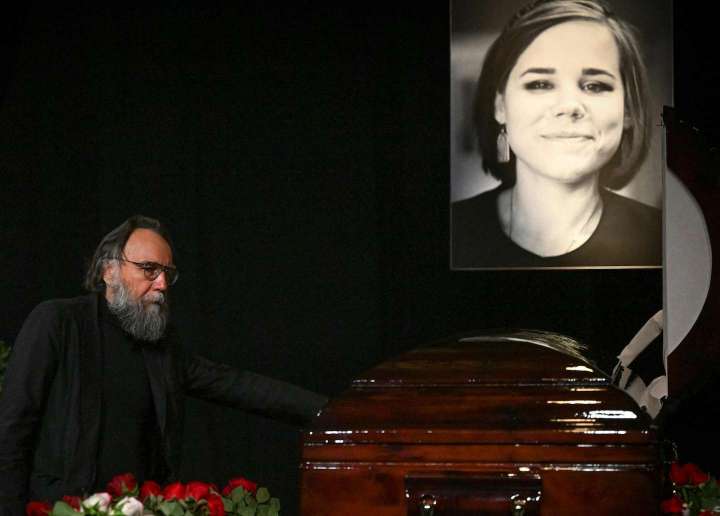Russians on Tuesday bade farewell to Daria Dugina, the daughter of the far-right ideologue Alexander Dugin, as calls grew in Russia for a tougher approach in the war against Ukraine, and the U.S. State Department warned that Moscow was likely to step up attacks on Ukrainian civilian targets and government institutions in coming days.
Russians at Daria Dugina memorial call for victory over Ukraine

The ceremony reinforced calls from Russian hawks for the country to take stronger action to crush Ukrainian military resistance.
Dugina died Saturday in a car-bomb attack in central Moscow. Russia’s security service, the FSB, blamed the killing on Ukraine’s security service Monday. Ukrainian officials have denied responsibility for the attack, calling it the result of internal Russian struggles.
At a civil memorial ceremony, hundreds lined up and filed past the casket in a darkened hall in the Ostaninko state television center in Moscow, laying roses and carnations beside it, crossing themselves and bowing to the casket. A spotlight illuminated a black and white image of her face. Large funeral wreaths with red roses and white lilies lined the hall, along with more photographs of Dugina.
Official black cars with blue lights pulled up to the television center, heavily guarded by members of the National Guard and riot police. Russians passed through four metal detectors to enter the hall.
Politicians, prominent state television anchors and other public figures addressed the memorial in turn, blaming Ukraine for the attack and calling for renewed efforts to defeat the country militarily. President Vladimir Putin sent a representative to convey his condolences, and Foreign Minister Sergei Lavrov sent a message calling the killing “a vile and inhuman crime.”
“Her tragic departure is an irreplaceable loss for the thinking, patriotic part of our society,” Lavrov said.
Among the mourners was wealthy businessman Yevgeniy Prigozhin, who is under U.S. sanctions and is described by the State Department as the manager and financier of the Wagner mercenary group, which is fighting alongside Russia’s military against Ukrainian forces in eastern Ukraine.
Dugin, an influential right-wing conservative Orthodox figure, has for years called for a Russian war to defeat Ukraine, and he developed the concept of a “Russian world,” in which neighboring states Ukraine and Belarus were not sovereign nations but part of Russia. His nationalist ideology was reflected in Putin’s view that Ukraine could not be independent, unless subjugated to Russia, a key pretext for his invasion of Ukraine in February.
Dugina, the chief editor of a Russian disinformation website who was herself under U.S. sanctions, had also been greatly supportive of Putin’s war against Ukraine.
Hard-line nationalists and internal critics of the Russian military approach have for months urged a military mobilization, a path the Kremlin has avoided because it would be deeply unpopular, preferring to downplay the war as a limited “special military operation” and concealing the extent of Moscow’s military casualties.
Fighting back tears at the memorial, Dugin said that his daughter died for Russia and that “this ultimate sacrifice, the highest price we pay, can only be justified by victory.”
He said she would not want Russians to glorify her but to “fight for our great country, defend our faith, holy Orthodoxy, love our Russian people, because she died for the people.”
“In our last conversation, she said: ‘Dad, I feel like a hero and a warrior. That is what I want to be. I don’t want any other fate. I want to be with my people, my country. I want to be on the side of the light,’ ” he said.
Russian parliamentarian Leonid Slutsky, who was a member of the Russian delegation at failed peace talks with Ukraine, said Dugina’s death made it difficult to speak of peace talks, calling the attack “a monstrous tragedy.”
“We are very well aware of the situation. Invisible people who speak the same language as we do are killing our children,” he said, referring to claims that Ukrainian intelligence assassinated Dugina in the heart of Russia’s capital.
Russian businessman Konstantin Malofeyev, the chairman of the right-wing Tsargrad television and closely associated with Dugin, called Dugina “a warrior.”
“Because of her death, we will definitely win this war,” he said. “She wanted this. She lived for it.”
Putin on Monday posthumously awarded Dugina a state medal, the Order of Courage, which was presented to her father at the memorial ceremony.
Ukrainian officials have denied any involvement in the blast that killed Dugina and have suggested that it could be the result of an internal dispute in Russia. “We certainly had nothing to do with it,” Mykhailo Podolyak, an adviser to Zelensky, said Sunday on Ukrainian television. Ukrainian officials also distanced themselves from the killing in interviews with The Washington Post.
Andrii Yusov, a spokesman for Ukraine’s chief directorate of military intelligence, previously told The Post that his agency would not comment on the killing of Dugina. Still, Yusov noted that “I can say that the process of internal destruction of the ‘Russky Mir,’ or ‘the Russian world,’ has begun,” and he predicted that “the Russian world will eat and devour itself from the inside.”
Annabelle Timsit and Rachel Pannett contributed to this report.






